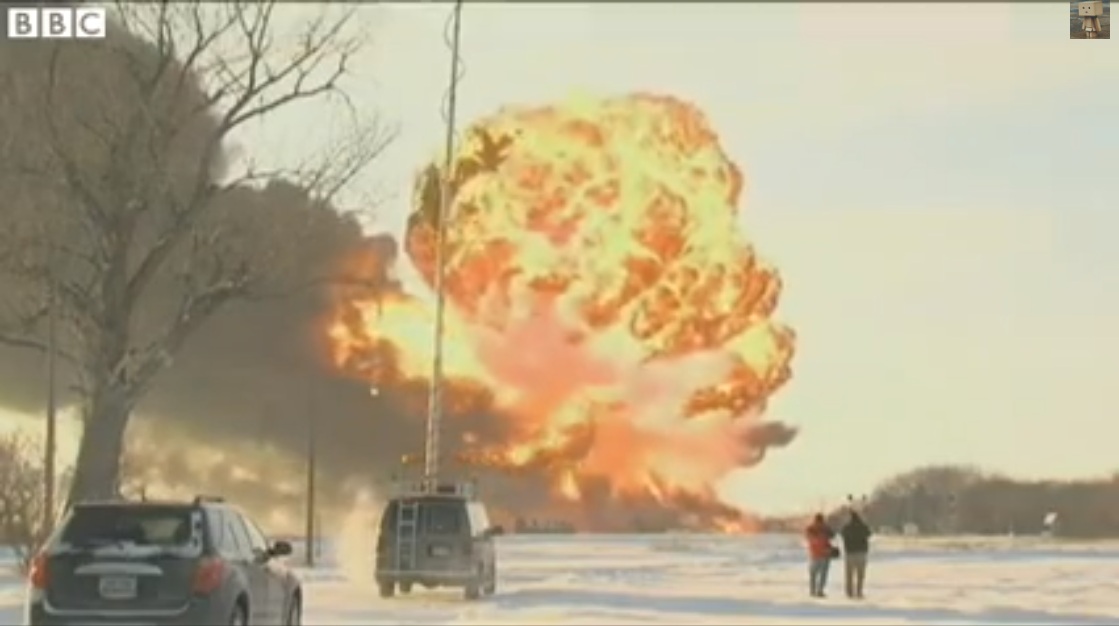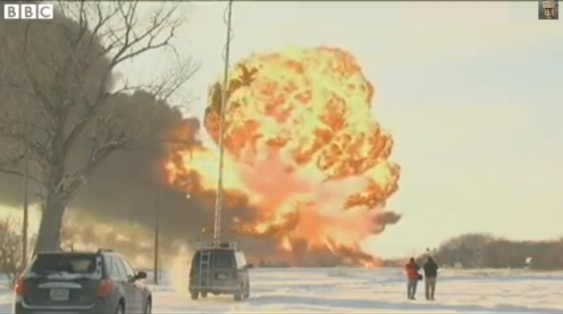With the recent blow-up in North Dakota, it seems everyone is (finally) paying attention to the risks of oil train explosions. I’m planning more analysis of the issue later, but for now here’s a roundup of some of the better pieces to read on the subject.
Hands down, the best reporting on the risk of oil-by-rail is coming from Canada’s flagship newspaper, the Globe and Mail. Grant Robertson’s first-hand investigation into the Bakken oil industry is particularly noteworthy. Among the damning findings:
A four-month investigation by the Globe and Mail found the oil being shipped from the Bakken region—which straddles North Dakota, and parts of Manitoba and Saskatchewan—is far more volatile than regulators and railways believed. The Globe found evidence that companies often don’t test their oil shipments for explosiveness before sending the trains, since crude oil, though flammable, hasn’t historically been considered extremely combustible.
The investigation also found that as more oil moved by rail in the past few years, no additional safety regulations were put in place by regulators to govern this growing method of shipping crude.
Robertson also had a good piece connecting the recent explosion in Cassleton, North Dakota to the lethal explosion in Lac-Mégantic, Quebec. For further Globe and Mail coverage of the North Dakota incident, I recommend the following: Town ‘Dodged a Bullet’ in Oil-Train Explosion, North Dakota Mayor Says; Booming North Dakota Takes Latest Oil-Train Wreck in Stride; and Pollution Level Dropping After Oil Train Crash in North Dakota.
The Globe and Mail‘s ongoing coverage of Lac-Mégantic is also very worth absorbing. I highly recommend North Dakota’s Explosive Bakken: The Story Behind a Troubling Crude; Inside the Oil-Shipping Free-For-All That Brought Disaster to Lac-Mégantic; The Deadly Secret Behind the Lac-Mégantic Inferno; and Why Towns are Powerless to Stop Another Lac-Mégantic.
In the US, McClatchy’s Curtis Tate, who has lately been doing excellent reporting on railroads, has a must-read piece on the rail industry’s slow response to growing fears about tanker car failures. It is an excellent newspaper-length overview of the subject, including this alarming fact:
The Railway Supply Institute, an industry group, last month proposed a 10-year timeline for retrofitting the entire tanker fleet. A final decision from the Pipeline and Hazardous Materials Safety Administration on what steps to take is expected this year.
AP reporters Matt Brown and James McPherson published an insightful article on the recent federal government warning about oil from the Bakken region.
At DeSmogBlog, Steve Horn casts an eye at the volatile chemicals that make Bakken oil especially dangerous.
For a more technical and industry-centered perspective on oil-by-rail trends, you won’t do better than the RBN Energy research by Sandy Felden (registration required). Felden has published truly impressive coverage of the issue, including—no kidding—a nine-part series on the economics of moving oil by train versus pipeline. (Links to all the entries in the series can be found here.) Since then, he’s written good pieces on the curiosities of the Canada-US oil trade and the future of crude by rail to the West Coast, and a follow-up look at the same.
At the Vancouver Sun, Gordon Hoekstra examines the calls for regulatory changes to railway operations in Canada.
For a detailed critique of Canadian railway regulations and oil industry influence, I suggest The Lac-Megantic Disaster: Where Does the Buck Stop?, a report by Bruce Campbell at the Canadian Centre for Policy Alternatives.
I’ve also been following the work of British Columbia writer Roger Annis who has produced a range of well-researched articles, often couched as media critiques, that focus on oil by rail and other new dimensions of the North American fossil fuel industry. I particularly benefited from his look at the risks to Vancouver neighborhoods and his piece on Canada’s fossil fuel wars. Other good ones are here, here, here, here, and here.
[Update 1/13/14] The Oregonian’s Rob Davis has an excellent investigation into the Northwest’s lack of preparedness for oil trains.
Finally, if you need a reminder for why any of this matters, take a look at some of the footage of the explosion in North Dakota. It doesn’t take much to imagine what this would look like in a city.
http://www.youtube.com/watch?v=Mb8tASVqEac
And it doesn’t take paranoia to worry that trains just like this one are already rolling through Spokane, Seattle, and many other communities across the Northwest.










David Scrimm
Pictures of These explosions and the air pollution in China need to be put in front of every person in America. I fear the train issue may end up supporting the Keystone pipeline.
David Scrimm
Robertson’s reporting is not as in-depth as I hoped. More on what cities and towns are at risk would be good to know. What are chemists or other scientists saying about the oil? Robertson also dismisses the barren unspoiled plains as worthless before the oil Boom – totally wrong. More is needed on the impacts of the boom, the deaths, the crime and the inevitable bust that will do even more damage to the Bakken victims.
David Moore
A couple more points on the North Dakota Bakken oil boom. They are flaring and thus wasting huge amounts of natural gas (like in Nigeria) due to lack of infrastructure. Second, there is no need to develop the resource this quickly for export and thus use up our potential future resource. Obama should keep the federally owned portion in a Strategic Reserve.